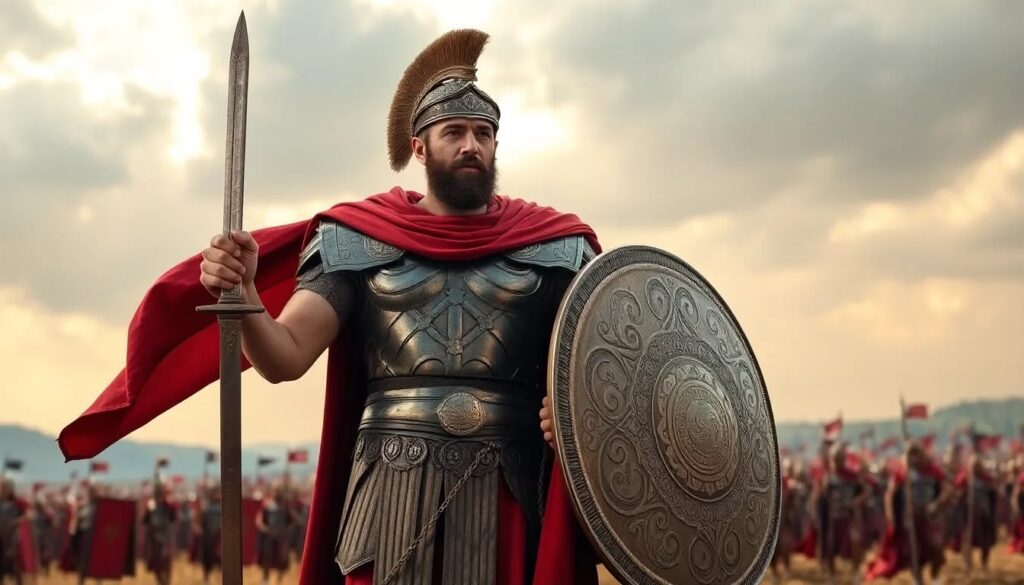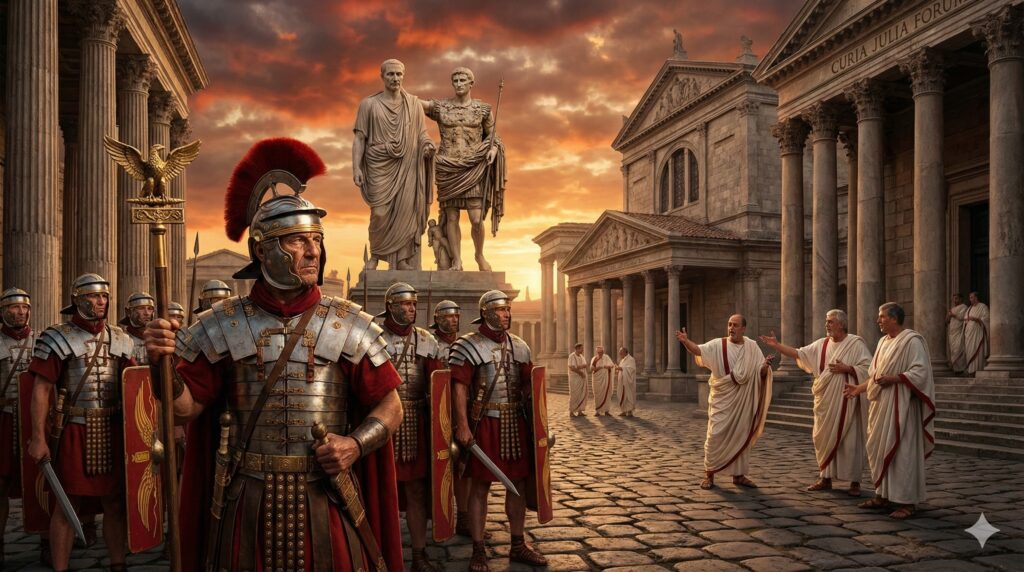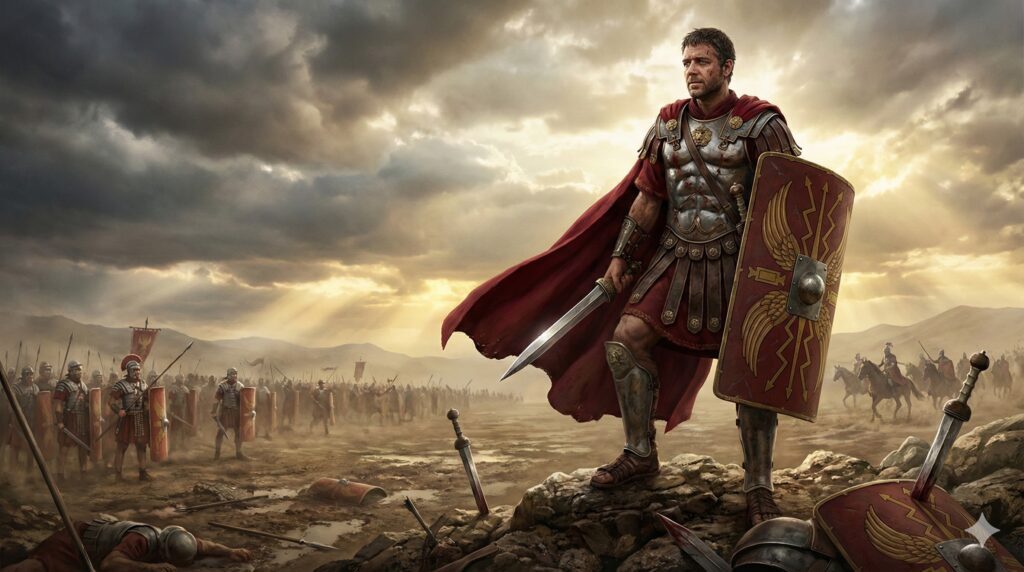The transition from the Roman Republic to the Roman Empire is one of the most important changes in ancient history. This shift was largely influenced by Roman generals, who used their military power to gain political control and eventually become emperors. The previous system of government, which involved shared decision-making and rule by the Senate, was replaced by a new era where individual leaders held absolute power.
This article delves into How Roman Generals Became Emperors: Ambition, Loyalty, and Betrayal. These three factors played a crucial role in the rise of military leaders to imperial authority:
- Ambition drove generals to seek influence beyond their military roles.
- Loyalty shifted from loyalty to Rome as a whole towards personal connections between soldiers and their commanders.
- Betrayal became a strategic tactic in navigating the unpredictable political landscape.
By examining these themes, we can better understand how military achievements intertwined with political strategies to reshape leadership in ancient Rome. For example, individuals like Scipio Africanus had significant impacts on history through their military tactics, such as defeating Hannibal during the Second Punic War and establishing Rome’s supremacy over Carthage. This victory not only altered the outcome of the war but also had wide-ranging effects on the Mediterranean region, showcasing how ambition and loyalty can lead to remarkable results.
Furthermore, it’s important to acknowledge that agriculture played a vital role in driving Rome’s economic growth during both the Republic and Empire. This sector encompassed more than just food production; it also influenced social development. Such economic stability provided the necessary resources for military expansion and political maneuvering.
The complexities of ancient Roman religion were also instrumental in shaping societal norms and governing structures during this time. The religious beliefs were not merely spiritual but formed an all-encompassing system that permeated every aspect of Roman existence.
For those looking to immerse themselves in this captivating history, platforms like Second Life offer interactive role-playing experiences set in the world of Romanum, providing users with an opportunity to engage with ancient Roman culture in a distinctive manner.
The Political and Military Landscape of Late Roman Republic
The late Roman Republic was marked by intense political turmoil, with power struggles between the Senate, popular assemblies, and ambitious individuals destabilizing the traditional governance system. This instability affected the military as well, where loyalty became increasingly fragmented amid competing factions.
Key features of this era include:
- Political instability: Frequent conflicts between optimates (aristocratic conservatives) and populares (populist leaders) eroded the authority of republican institutions, as detailed in this exploration of the structure of power in the Roman Republic.
- Rise of private armies: Wealthy generals began to command personal armies rather than state-controlled forces, blurring lines between military service to Rome and allegiance to individual commanders.
- Military reforms by Gaius Marius: Around 107 BCE, Marius introduced groundbreaking changes to the Roman legions:
- Recruitment opened to landless citizens, creating a professional standing army.
- Soldiers were equipped and supported by the state but increasingly depended on their generals for rewards after campaigns.
These reforms had profound consequences:
- The traditional militia model gave way to a professional force with soldiers whose primary loyalty shifted from the Republic itself to their general.
- Generals like Marius could cultivate strong personal followings within their legions through promises of land, wealth, and social advancement.
This realignment of soldier allegiance set the stage for military leaders to leverage their troops’ loyalty as a political tool—an essential factor in their eventual pursuit of supreme power within Rome. Such a dynamic is reflective of the rise and fall of the Roman Empire, which was not merely a political entity but a tapestry woven from diverse cultures, languages, and traditions.
Moreover, the Roman Army played a crucial role in shaping this empire with its structure, strategies, and operational effectiveness. The military might not only achieved victories across large areas but also served as a foundation for future governance and cultural exchange.

Ambition: The Driving Force Behind Generals’ Imperial Goals
Ambition was a key factor in the quest for power by many Roman generals. Military success alone wasn’t sufficient; they wanted to turn their victories on the battlefield into political authority. This desire pushed them to go beyond their traditional roles and motivated them to reshape the Republic’s political landscape in their favor.
Julius Caesar: An Example of Ambition
Julius Caesar is a prime example of this ambition. His decision to cross the Rubicon River in 49 BCE clearly showed that he wanted control beyond just being a military leader. By defying the Senate, he sparked a civil war, indicating that his ambitions were aimed at acquiring supreme power. His successful military campaigns in Gaul had earned him a loyal army and great prestige, which he used to challenge Rome’s established order.
Octavian: A Different Kind of Ambition
Octavian, who later became known as Augustus, demonstrated ambition through strategic patience. After Caesar was assassinated, Octavian utilized his inherited military support and political cunning to outsmart rivals such as Mark Antony and Lepidus. He consolidated power by forming careful alliances and making calculated displays of strength, allowing him to establish the principate without completely dismantling Republican institutions.
Factors Driving Ambition
Several key factors drove the ambition of these generals:
- Personal prestige gained from military victories
- Control over loyal armies ready to enforce political goals
- The chance to fill power vacuums created by instability in the Republic
The ambitions of generals like Caesar and Octavian had a profound impact on how Rome was governed. They turned military commanders into emperors through their calculated pursuit of ultimate authority.

The Broader Impact of Ambition
This transformation didn’t only affect politics; it also had repercussions in various aspects of Roman society such as architecture, entertainment, art, culture, and social hierarchy.
Architecture as a Reflection of Power
The Roman architecture that emerged during this time serves as a testament to the power and cultural identity of these ambitious leaders.
Gladiators: Heroes or Victims?
Similarly, the rise of gladiators, who were both admired warriors and victims of a complex social system, reflects the societal changes brought about by these ambitious leaders.
Artistic Expressions Influenced by Tradition
Moreover, their ambition also left an enduring impact on art and culture in ancient Rome. This period witnessed remarkable artistic expressions influenced by earlier Greek and Etruscan traditions.
The Role of Patricians in Shaping Luxury and Power Dynamics
Furthermore, the patricians, who were the wealthy elite of ancient Rome, played a significant role in shaping its luxury and power dynamics—distinct from those experienced by working-class plebeians.
The Shift in Loyalty: From the State to Individual Generals
During the late Republic, the loyalty of Roman legions underwent a significant change. In the past, soldiers pledged their loyalty to the Res Publica—the Roman state itself. This loyalty ensured that military power remained under the control of the Senate and the republic. However, changes in how the military was recruited and rewarded disrupted this balance and shifted loyalty towards individual generals.
Key factors driving this shift included:
- Military Reforms by Gaius Marius: By allowing landless citizens to enlist, Marius created a professional standing army dependent on their commander for pay and prospects. Some historians argue that these Marian reforms were responsible for the fall of the Republic, significantly altering the landscape of Roman politics and society.
- Land Grants and Wealth Distribution: Generals promised and delivered land parcels and monetary rewards to veterans, establishing a personal bond of gratitude and obligation.
- Security and Patronage: Soldiers relied on their commanders not only for battlefield leadership but also for protection against political enemies and legal troubles.
These factors fostered personal allegiance that often superseded loyalty to the Republic. Soldiers identified more closely with their general’s fortunes than with abstract institutions. This realignment allowed ambitious commanders to use legions as tools of political power instead of just representatives of state policy.
The change in loyalty was crucial for understanding How Roman Generals Became Emperors: Ambition, Loyalty, and Betrayal. It created opportunities for generals to turn their troops’ devotion into political influence, leading to dramatic challenges against Rome’s traditional order.

Betrayal: A Strategic Tool in the Quest for Imperial Power
Betrayal was a common and effective political maneuver among Roman generals and emperors seeking to secure or expand their power. The unstable environment of the late Republic and early Empire created opportunities where trust was weak, and alliances were often temporary. Generals frequently turned against each other or even against sitting emperors to advance their ambitions. This practice was not limited to battlefield tactics but extended deeply into the political arena.
The Role of the Praetorian Guard
The Praetorian Guard played a crucial role in this dynamic, acting both as protectors of the emperor and as facilitators of political intrigue. Originally established as an elite unit tasked with guarding Rome’s rulers, the Guard evolved into a powerful political force capable of influencing imperial succession through coups. Their loyalty could be bought or manipulated, turning them into kingmakers who sometimes betrayed the very emperors they were sworn to protect.
Key Aspects of Betrayal Involving the Praetorian Guard
Key aspects of betrayal involving the Praetorian Guard include:
- Assassinations and coups: The Guard orchestrated or supported violent removals of emperors, such as the murder of Caligula and the auctioning off of the imperial throne after Pertinax’s assassination.
- Political bargaining: Emperors often bribed the Guard to secure their loyalty, creating a cycle of corruption and betrayal that destabilized imperial authority.
- Shifting allegiances: The Praetorian Guard switched sides during conflicts, backing generals whose promises suited their interests best, which often determined the outcome of power struggles.
This constant undercurrent of betrayal reveals how crucial control over military loyalty was—not just on campaign but within Rome’s very heart—shaping who ultimately wore the imperial crown.
The Influence of Roman Law and Mythology
Furthermore, these betrayals occurred within a framework heavily influenced by Roman law, which has played a crucial role in shaping modern legal systems. Understanding this legacy is essential for grasping the foundations of contemporary laws. Additionally, the influence of Roman mythology on modern culture reflects how deeply ingrained these historical narratives are in our societal norms and political aspirations.

Case Studies: Ambitious Generals Who Became Emperors
1. Julius Caesar
Caesar’s rise exemplifies ambition forged through military prowess and political acumen. His campaigns in Gaul expanded Rome’s territories, earning him the loyalty of his legions and immense popularity among the people. Crossing the Rubicon in 49 BCE marked a decisive break from Republican norms, signaling his willingness to defy the Senate to achieve power.
- Caesar’s ambition extended beyond battlefield victories; he skillfully navigated Roman politics, forming the First Triumvirate to consolidate influence.
- His appointment as dictator for life reflected both his dominance and the erosion of traditional Republican restraint.
- The blend of military success and political maneuvering positioned Caesar as a central figure challenging Rome’s existing power structures.
2. Augustus (Octavian)
Augustus transformed military backing into lasting imperial authority through calculated strategy and statesmanship. As Julius Caesar’s adopted heir, he inherited a legacy intertwined with both opportunity and danger.
- The defeat of Mark Antony and Cleopatra at Actium secured Augustus’ supremacy over Rome’s factions.
- He balanced military strength with political reforms, presenting himself as restoring the Republic while wielding imperial power behind the scenes.
- Augustus established key institutions that centralized authority but maintained a façade of traditional governance, ensuring stability after years of civil war.
- His reign marked the beginning of the Roman Empire, demonstrating how combining military loyalty with political skill could redefine leadership in Rome.
While exploring this fascinating period in history, one cannot overlook the legal status of Roman women, which reflects a complex interplay of rights and restrictions that significantly influenced gender dynamics in ancient Rome. Additionally, understanding the lives of plebeians, who were vital to the fabric of Roman society, provides a more comprehensive view of this era.
For those interested in delving deeper into the broader context of ancient Rome, including its innovations, culture, and governance, these aspects also played a crucial role in shaping its history. Furthermore, the philosophical influences such as Stoicism that emerged during this time have left an enduring mark on Roman thought.
Finally, it is essential to recognize the lasting impact of Roman law on modern legal systems, highlighted by documents like the Corpus Juris Civilis, which serves as a significant achievement in the history of law.
The Lasting Impact of Ambition, Loyalty, and Betrayal in Roman History
The shift from the Republic to the Empire was greatly influenced by ambition, loyalty, and betrayal. These forces not only helped individual generals rise to power but also changed Rome’s political landscape.
How These Forces Shaped Rome
Ambition, loyalty, and betrayal played crucial roles in shaping the transition from Republic to Empire in ancient Rome:
- Ambition: Military leaders challenged the existing system, turning their personal achievements into imperial power.
- Loyalty: Soldiers shifted their loyalty from the state to their commanders, who prioritized their well-being and rewards.
- Betrayal: Betrayal became a strategic move, undermining traditional governance and allowing swift changes in leadership.
The Impact on Governance
These dynamics had a significant impact on how ancient Rome was governed:
- Military power became concentrated in the hands of emperors instead of republican institutions.
- Political legitimacy started relying on control over armies rather than approval from the Senate.
- A culture of political intrigue emerged where survival depended on constant vigilance and forming strategic alliances.
Understanding the Fragile Balance of Power
The book How Roman Generals Became Emperors: Ambition, Loyalty, and Betrayal provides valuable insights into this delicate balance between military authority and political rule. It explores how this balance shaped Rome’s transformation and influenced leadership models throughout history.
The Role of Spectacle in Ancient Rome
The grandeur of ancient Rome—featuring gladiators, chariot races, and theaters—had a significant impact on society. These spectacles were not merely forms of entertainment; they played a vital role in shaping social dynamics and reinforcing political power.
The Significance of the Twelve Tables
The Twelve Tables, established between 451-450 BCE, marked a crucial turning point in the evolution of Roman law. They represented the first attempt to codify the intricate and often arbitrary legal practices prevalent in ancient Rome.
The Enduring Legacy of Ancient Rome
The legacy of Ancient Rome continues to be a fundamental pillar of Western civilization. From its humble beginnings as a small city-state to its transformation into an expansive empire, Rome’s influence remains profound and enduring. The impact of Roman culture, governance, and innovations can be observed in various aspects of contemporary society.
Exploring Daily Life in Ancient Rome
Daily life in Ancient Rome varied significantly across different social classes. Understanding the social class divide offers further insights into this intricate societal structure.
FAQs (Frequently Asked Questions)
How did ambition drive Roman generals to become emperors during the transition from Republic to Empire?
Ambition was a key catalyst that motivated Roman generals like Julius Caesar and Octavian to seek power beyond their military commands. Their personal ambitions led them to pivotal actions such as Caesar’s crossing of the Rubicon and Octavian’s strategic consolidation of power, ultimately facilitating their rise to imperial authority.
What role did loyalty play in shifting allegiance from the Roman Republic to individual generals?
Loyalty among Roman legions shifted from the state as an institution to personal allegiance toward individual commanders. Factors such as land grants, wealth, and security fostered this personal loyalty among troops, enabling generals to leverage military support for political power during the late Republic.
How did military reforms by Gaius Marius impact soldier loyalty and the political landscape of the late Roman Republic?
Gaius Marius’ military reforms professionalized the Roman legions by recruiting landless citizens and offering them pay and benefits. This transformation altered soldier loyalty, making troops more personally loyal to their generals who provided rewards, thereby contributing to political instability and the eventual rise of military leaders as emperors.
In what ways was betrayal used as a strategic tool by Roman generals in their quest for imperial power?
Betrayal was prevalent as a political maneuver among Roman generals and emperors. The Praetorian Guard exemplified this dual role by both protecting emperors and facilitating coups through acts of betrayal, thus serving as a strategic instrument in power struggles during Rome’s transition from Republic to Empire.
Can you provide examples of ambitious Roman generals who successfully became emperors?
Notable case studies include Julius Caesar, whose military conquests and political maneuvering showcased his ambition leading to dictatorship, and Augustus (Octavian), who strategically used military backing and political skill to establish himself as Rome’s first emperor, marking the definitive shift from Republic to Empire.
What is the enduring legacy of ambition, loyalty, and betrayal in shaping Roman history?
The dynamics of ambition, loyalty, and betrayal not only influenced individual careers but also shaped the broader course of Roman history. These forces drove the transition from Republic to Empire, altered governance structures, redefined military authority, and set precedents for leadership that impacted ancient Rome’s political evolution.

